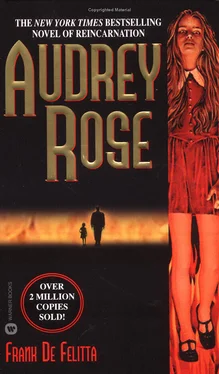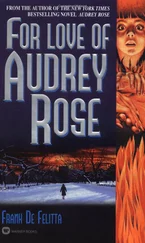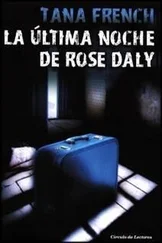And below it was the credit line: “ Esoteric Astrology , by Alan Leo.”
A shudder of superstition and fear went through Janice as she tore the card into small pieces and threw them into the trash can. Next, with a set face and trembling hand, she picked up the plant and all its green tissue and, holding it away from her body as if it were something loathsome, carried it out to the service hall incinerator and dropped it down the chute. It was the only thing to do, she thought, sensing a sudden power and mastery over her destiny, a perfectly normal, healthy reaction to a foe’s sneak attack.
The house telephone was ringing as she reentered the apartment. She closed the service door and bolted it, before taking up the receiver.
“There’s a Mr. Hoover on the line, Miz Templeton,” came Dominick’s high-pitched voice. Janice felt a leap of panic and was about to refuse the call when she abruptly changed her mind. She had acted resolutely and correctly with the flowers; what then had she to fear from the man who had sent them? He was the enemy, and the enemy must be dealt with.
“Connect him, please,” she said as her quivering hand went to her head and brushed a wisp of hair away.
“Hello, Mrs. Templeton?” Hoover’s voice bore a distinct note of anxiety.
“Yes,” replied Janice tremulously.
“Good morning, thank you for talking to me. I just called to find out how your daughter is.”
“ Ivy is much better,” answered Janice very gravely.
“But not well enough for school. You’re very wise to keep her home.”
The statement required no answer, and Janice made none.
Hoover picked up the slack with: “I wonder if you’d mind my dropping in? I think we have a great deal to talk about.”
“You’ll have to ask my husband about that.”
“Would you put him on, please?’
“He isn’t here.”
“Oh?” Hoover seemed surprised. “His office said he was home ill.”
“He’s gone to see the doctor.”
“I hope it’s not serious.” Then, shifting mood: “By the way, have you had a chance to look at the books I sent you?”
“No. I haven’t the time for books. Besides, I’m not interested in the subject.”
“Oh?” said Hoover quietly. “I thought, after what happened last night, you might want to know more about … the subject.”
“You’re wrong, Mr. Hoover.” Janice was finding a new strength in her voice. “Nothing happened last night to increase my interest in your books.”
“I don’t believe that, Mrs. Templeton. I saw the look on your face when”—he paused, seeking the right words to express his next thought—“when Audrey Rose sensed my presence nearby and made contact with me through Ivy. You had the look of a person who had just witnessed a miracle, as it surely was. Your husband was too overwrought to perceive it, but you certainly did.”
“The look you saw on my face, Mr. Hoover, was the look of a mother in despair over the health of her child. It is a look I often wear, as my daughter often experiences these attacks.”
“She does?” Hoover said, as if stung.
“Yes, Mr. Hoover, several times a month over the last nine years,” Janice lied. “What happened last night was not unique, nor was what you did to calm her. Her psychiatrist uses a similar technique to bring her out of these trances. It’s called suggestive hypnosis.”
“I didn’t know Ivy was under the care of a psychiatrist,” Hoover replied, as if berating himself for having failed to discover this fact in his research on them.
“Well, she is. And the cause of her problem has been fully defined and is well known. It relates directly to an accident she had when she was an infant—a milk bottle that was too hot burned her fingers and made a lasting impression on her mind. The ‘hot, hot, hot’ she babbles refers to the milk bottle and nothing else.” Janice could hardly believe the words were her own.
“Your psychiatrist approves of this theory?”
“Yes, she does.”
“I think she’s wrong,” said Hoover in a voice deflated of energy. “I think your daughter may be in far greater trouble.”
“You may think that, Mr. Hoover, but we do not. We believe in our doctor, have confidence in her training and experience, and trust her completely. Furthermore,” Janice continued, socking it home to him, “we believe in medical science, not in superstition.”
Hoover was silent a moment, then spoke in a tone that was quietly respectful, and even sympathetic.
“Do you have a religion, Mrs. Templeton?”
“No, I don’t believe in religion.”
“Were you always an atheist?”
“Yes, always. And I’d really appreciate it if you’d stop sending me your religious books, your flowers, your sayings, or anything else regarding your beliefs, as I have absolutely no interest in the subject, nor do I have the time to continue this conversation, so goodbye, Mr. Hoover....”
Janice quickly lowered the receiver onto its cradle without giving him a chance to say another word. She was trembling with the fevered excitement of an athlete who has just won a race, her heart fluttering, but her soul uplifted by success. A drink, she thought, would be marvelous. She had never drunk liquor this early in the morning, but this was a morning like no others.
Sipping the neat scotch, seated in the rocker, vaguely hearing the television upstairs, Janice wondered why she had lied to Elliot Hoover about the history of Ivy’s nightmares. It was fear. He was seeking a wedge into her mind. He was the enemy. One doesn’t share truths with the enemy.
Actually, the nightmares had struck only once before—beginning one night soon after Ivy’s second birthday and persisting for nearly a year.
Dr. Ellen Vassar, whom Bill promptly nicknamed Braünnhilde, had swooped down into their lives like an avenging angel, her strong, heavily accented voice and razor-sharp Freudian mind probing, questioning, analyzing, and finally succeeding in casting the demons out of Ivy’s dreams.
Janice recalled the strong, humorless face of the German psychiatrist at their last session and her parting words to them.
“Your child was expressing some special fears of separation from you, Mrs. Templeton, and she appears now to have mastered those fears, which children do as they grow older. However, do not treat her as though she were in any way special and fragile. Simply treat her as any three-year-old. You should have no further trouble.”
And now, seven years later, the demons were back, with a renewed and murderous fury.…
Janice felt a glacial chill rise within her and quickly swallowed some scotch to dispel it.
Suggestive hypnosis? That was Bill’s theory. It had worked for Dr. Vassar. Why not for Elliot Hoover? Well, why not? His explanation was too self-serving and convenient to be believed.
She was less certain of why she had lied to Hoover about her religion.
Born a Catholic, she had gone through all the rituals of that somber faith and had actually enjoyed being frightened by the nuns’ talk of death and resurrection when she was a child. The church, St. Andrew’s, was hewn out of ancient and silent stone, covered with fungus and stained with bird droppings. Entering its massive, silent mustiness was like walking into Dracula’s castle. Yet she had truly believed in all the lovely, improbable promises of heaven, the sick, terrifying threats of hell.
She had stopped believing even before high school. She went to mass each Sunday to please her parents, as a matter of rote. The Latin words and rites had been reduced to a meaningless jumble by then. In her third year of high school she left the Church. Her parents never said a word. They were pained by her decision, but they never said a word. In the back of her mind, Janice feared a terrible retribution for her sin of inconstancy. She knew that when the time for death came, she would wish to have the last blessed sacrament read over her and receive extreme unction.
Читать дальше












